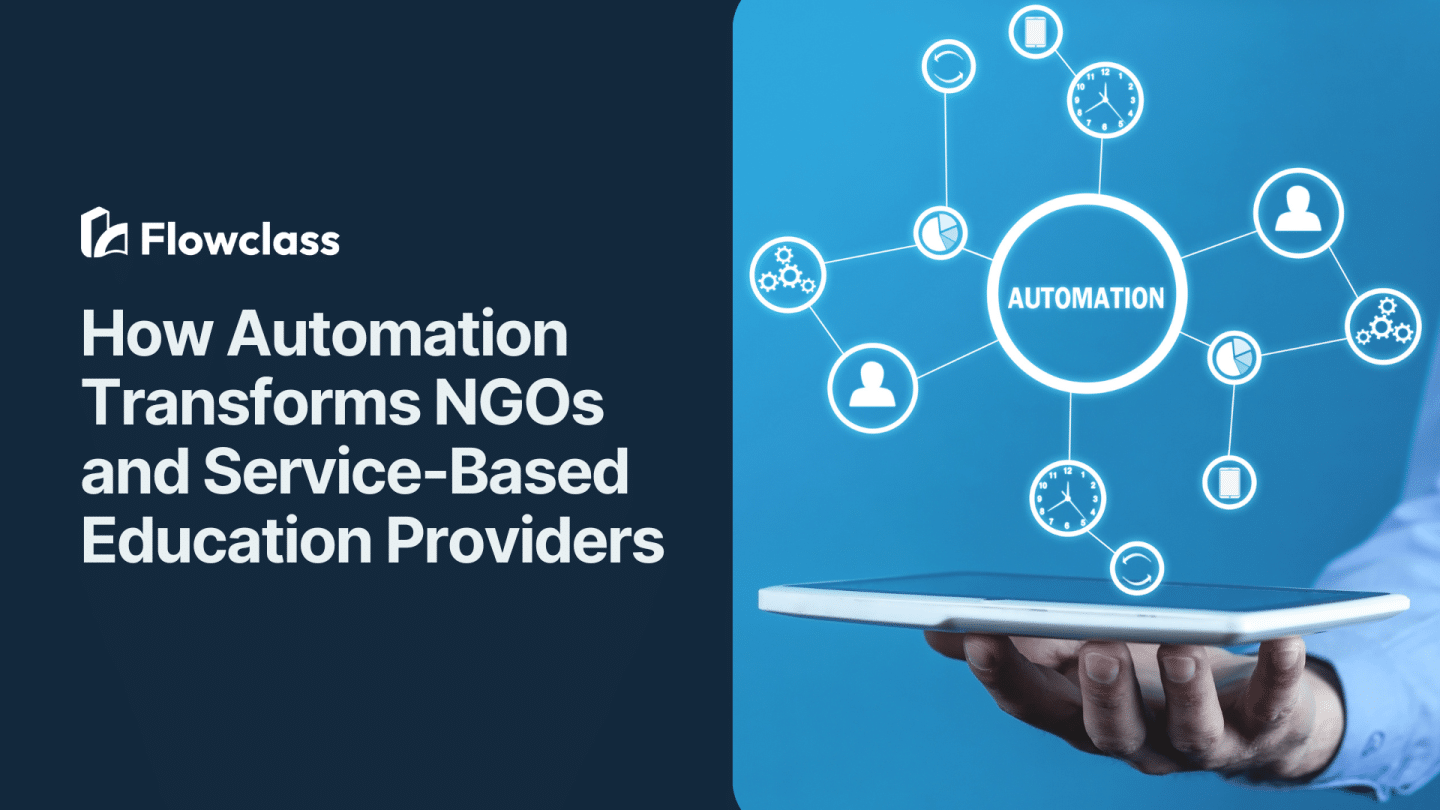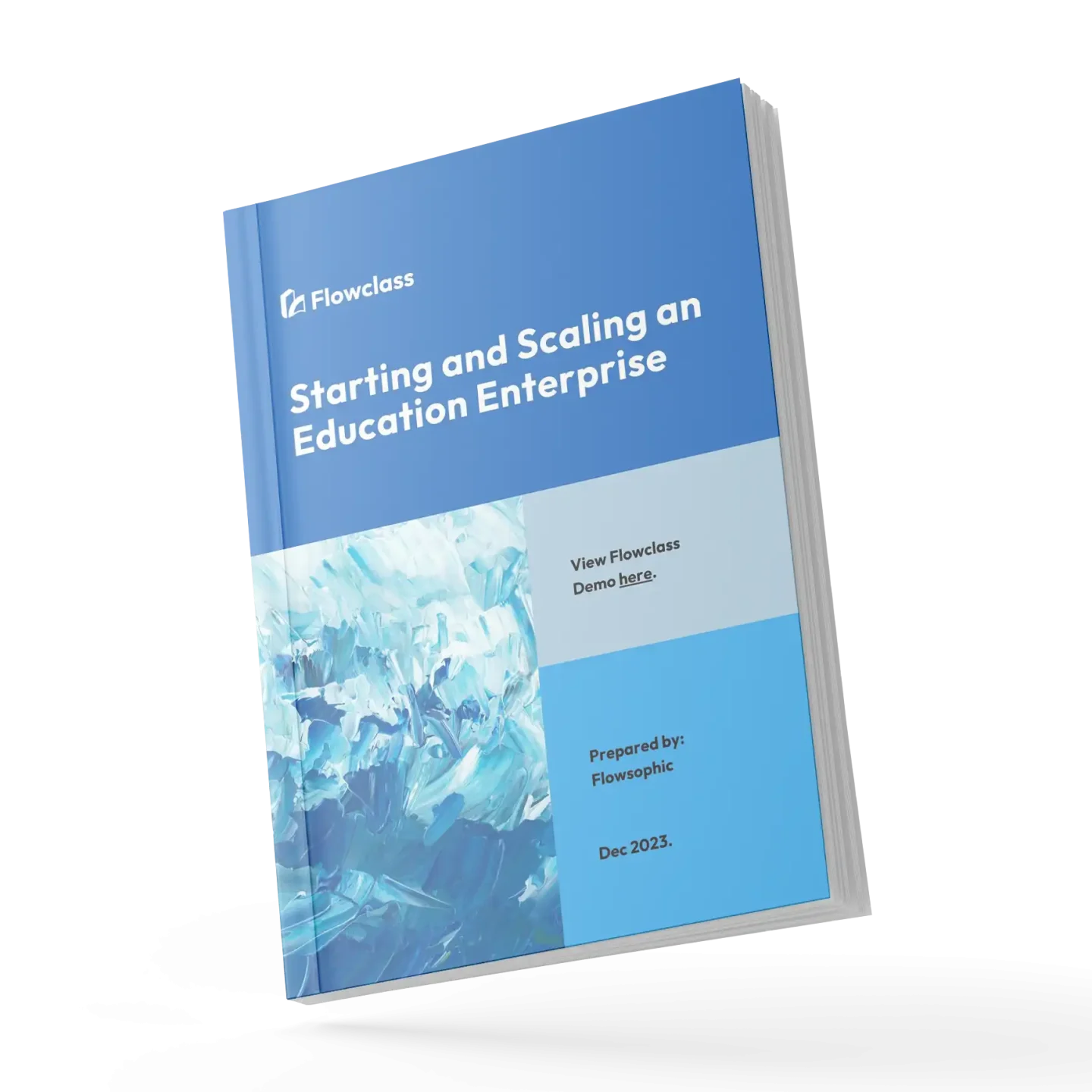Non-governmental organizations (NGOs) and service-based education providers often face operational challenges that hinder their ability to deliver quality education efficiently. From managing student data to processing payments and organizing events, these organizations need effective solutions to streamline their workflows.
This is where automation for NGOs becomes a game-changer. Flowclass offers tailored automation solutions to help NGOs and education providers optimize their processes and improve impact.
By reducing the manual workload and enhancing operational efficiency, automation allows NGOs to allocate more time and resources toward their core mission of empowering communities and improving access to education.

The Importance of Automation for NGOs
Automation is essential for NGOs that seek to minimize administrative burdens and maximize resource allocation. By leveraging automation for NGOs, organizations can focus on their mission rather than getting bogged down by manual tasks. Whether it’s managing student data or automating event registration, digital tools are reshaping how impact-driven organizations operate.Here are a few key reasons why automation is vital:
For example, a recent TechSoup article highlights how automation helps nonprofits reduce errors and streamline their work, aligning perfectly with what Flowclass provides.
- Efficiency: Reduces the time spent on repetitive administrative work, allowing NGOs to focus on their programs and beneficiaries rather than being overwhelmed by paperwork and manual data entry.
- Accuracy: Minimizes errors in record-keeping and financial transactions, ensuring that donor contributions, student records, and financial reports are maintained with precision and transparency.
- Scalability: Enables NGOs to expand their reach without increasing operational complexity, allowing them to serve more students and communities without requiring a proportional increase in administrative workload.
- Cost Savings: Lowers overhead costs associated with manual processes, reducing the need for excessive staffing and resource consumption, which in turn allows NGOs to allocate funds more effectively toward their core initiatives.
For example, a community-based education NGO in Southeast Asia partnered with Flowclass to automate their student registration, payment tracking, and event coordination. By streamlining these tasks through Flowclass’s student CRM and automation workflows, the organization cut administrative hours by nearly 40%. This allowed them to reallocate those resources toward launching new literacy programs in underserved areas—boosting both operational efficiency and community impact.

How Automation Enhances NGO Operations
Flowclass provides a comprehensive suite of automation tools designed specifically for NGOs and service-based education providers. These tools help streamline key areas such as student management, payment processing, and event coordination. By integrating automation into their daily operations, NGOs can experience increased efficiency, better organization, and improved engagement with stakeholders.
1. Automated Student CRM for NGOs
Managing student records manually can be overwhelming for NGOs running educational programs. Flowclass offers an automated student CRM that enables NGOs to:
- Store and access student profiles in a centralized database, ensuring that all essential information is easily retrievable without having to sort through piles of paperwork.
- Track attendance and academic progress effortlessly, allowing educators and program coordinators to monitor student engagement and tailor learning programs accordingly.
- Send automated notifications to students and parents, keeping them informed about class schedules, upcoming events, and academic performance updates.
With a well-structured CRM, NGOs can enhance communication, maintain accurate records, and personalize the learning experience for students, ultimately leading to better educational outcomes.
For Example:
A youth development NGO in Kenya runs after-school STEM programs for students in underserved communities. Before adopting an automated CRM, staff spent hours each week updating spreadsheets, manually calling parents about schedule changes, and compiling progress reports. After switching to a digital CRM system, they centralized all student data, automated SMS reminders for parents, and tracked student attendance with a mobile check-in feature. As a result, parent engagement increased by 60%, and the staff saved over 20 hours a week on admin tasks—time they now invest directly in improving their curriculum.

2. Multi-Channel Payment Automation
Processing payments for donations, tuition, and event registrations can be challenging for NGOs. Flowclass simplifies this with its multi-channel payment automation system. This feature allows NGOs to:
- Accept payments via different methods, including bank transfers, credit cards, and mobile wallets, making transactions more accessible and convenient for donors and students alike.
- Generate instant receipts and send automated confirmations, eliminating the risk of delayed or lost payment acknowledgments and ensuring transparency in financial transactions.
- Set up recurring payments for donors and students, allowing NGOs to maintain a steady flow of funding and tuition without the need for constant manual intervention.
For Example:
Teach For India, a nonprofit focused on equitable education, implemented automated payment and donor management systems to streamline its fundraising efforts. By integrating digital payment tools, they reduced donor churn, improved transaction transparency, and scaled recurring contributions. According to a case study by GiveIndia, automation helped them process thousands of donations with minimal manual effort, allowing the team to focus more on donor engagement and program delivery.
3. Event Check-In and Registration with QR Codes
Organizing educational events, workshops, and training sessions requires seamless coordination. Flowclass offers an event check-in and registration system with QR codes, making it easy for NGOs to:
- Automate attendee registration and check-in, eliminating long queues and manual entry errors while ensuring a smooth and organized event experience.
- Generate unique QR codes for each participant, streamlining access control and providing a hassle-free check-in process for event attendees.
- Track event participation and engagement, helping NGOs analyze attendee behavior, measure event success, and refine future programs for greater impact.
By eliminating the need for manual registrations, NGOs can focus more on delivering valuable content to their attendees while ensuring smooth event operations.
4. Automated Communication Channels
Effective communication is crucial for NGOs to keep students, donors, and volunteers informed. Flowclass integrates automated communication channels, allowing NGOs to:
- Send scheduled email and SMS reminders for upcoming classes, donation drives, and important events, ensuring that stakeholders stay engaged and informed.
- Automate follow-ups for donations and registrations, providing timely acknowledgments and encouraging continued support from donors and volunteers.
- Create personalized messages for different audience segments, allowing NGOs to build meaningful relationships with their community members and increase participation in their initiatives.
This level of automation enhances engagement, strengthens connections with supporters, and ensures timely communication with stakeholders, leading to higher retention and involvement rates.
5. Data Analytics and Reporting
Making informed decisions requires access to accurate data. Flowclass provides data analytics and reporting tools that help NGOs:
- Generate real-time reports on student progress and program impact, enabling data-driven decision-making and continuous program improvement.
- Analyze financial transactions and donor contributions, providing a clear view of an NGO’s funding sources and financial sustainability.
- Measure the effectiveness of outreach campaigns, helping NGOs refine their strategies and maximize their reach to new donors, students, and volunteers.
With these insights, NGOs can refine their strategies, enhance their operational efficiency, and demonstrate the effectiveness of their programs to stakeholders and funding partners.

Benefits of Using Automation for NGO
NGOs that leverage automation enjoy numerous benefits, including:
- Increased Productivity: Automating repetitive tasks allows staff to focus on program development and community engagement, ultimately leading to greater impact and growth.
- Enhanced Transparency: Detailed reports and tracking mechanisms ensure accountability in financial and operational processes, which is crucial for maintaining donor trust and compliance with regulations.
- Better Donor Relations: Automated communication and payment processing make it easier to maintain relationships with donors, encouraging continued contributions and long-term support.
- Improved Learning Outcomes: Automated CRM and communication tools help provide a structured and engaging learning environment, resulting in better student performance and retention rates.
Getting Started with Flowclass
Implementing automation for NGOs through Flowclass is a straightforward process. Here’s how organizations can get started:
- Assess Needs: Identify key operational areas that require automation, such as student management, communication, and payment processing.
- Customize Solutions: Work with Flowclass to tailor automation features according to organizational needs, ensuring that each tool aligns with specific workflows and goals.
- Train Staff: Ensure staff members are equipped to utilize automation tools effectively, providing training sessions to maximize adoption and efficiency.
- Monitor and Optimize: Use analytics to track performance, identify areas for improvement, and continuously enhance automation processes for sustained success.
Ready to streamline your operations and focus more on your mission?
Chat with our Flowclass team on WhatsApp to explore how automation can work for your organization.
Conclusion
Automation is transforming the way NGOs and service-based education providers operate, making processes more efficient and impactful. With Flowclass, organizations can leverage automation for NGOs to enhance student management, streamline payments, optimize events, and improve communication. By integrating these automated solutions, NGOs can focus on their core mission—providing quality education and making a difference in communities.


